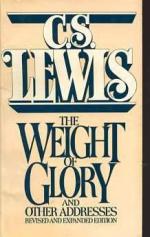
|
| Name: _________________________ | Period: ___________________ |
This test consists of 15 multiple choice questions and 5 short answer questions.
Multiple Choice Questions
1. Lewis comments, when discussing the appropriateness of scholarship during war, that our tendency to focus on things other than war is our nature rather than what?
(a) Zest.
(b) Éclat.
(c) Panache.
(d) Charisma.
2. Lewis gives the example of Pepys in his discussion of transposition, saying that Pepys experienced the same sensation from all but which of the following?
(a) Music.
(b) Sickness.
(c) Love.
(d) Food.
3. In "The Weight of Glory", Lewis says he feels as though he is trying to rip a secret from his audience that they commonly refer to as all but which of the following?
(a) Romanticism.
(b) Nostalgia.
(c) Adolescence.
(d) Innocence.
4. What is the first Pacifist position ruled out by Lewis in "Why I am Not a Pacifist"?
(a) Wars do more harm than good.
(b) It is too expensive to fight wars.
(c) Killing of human beings is always wrong.
(d) War is evil.
5. What is the second Pacifist position ruled out by Lewis in "Why I am Not a Pacifist"?
(a) Wars do more harm than good.
(b) War is evil.
(c) It is too expensive to fight wars.
(d) Killing of human beings is always wrong.
6. While discussing the cynic's questions about religion, Lewis says that religious language and imagery contains nothing that has not been borrowed from what?
(a) Nature.
(b) Literature.
(c) Bible.
(d) Pastors.
7. When discussing how we should decide a question of morals, Lewis states that every moral judgment involves all but which of the following?
(a) Facts.
(b) Reasoning.
(c) Intuition.
(d) Precedent.
8. Lewis states, when discussing intense aesthetic rapture, that if he tries to catch the feeling it produces, what happens?
(a) Nothing ever happens.
(b) He often loses track of the aesthetic experience.
(c) He gets frustrated.
(d) He grasps only a physical sensation.
9. When discussing mental exercises to defend the scholar against war, what does Lewis give as the second enemy?
(a) Excitement.
(b) Love.
(c) Frustration.
(d) Fear.
10. What happens at the end of Lewis's analogy when the boy in the dungeon learns that there are no pencil marks in the outside world?
(a) He becomes angry with his mother for lying.
(b) He is released from prison.
(c) His notion of the world becomes blank.
(d) The mother has to rethink her strategy.
11. Lewis describes, in "Why I am Not a Pacifist," a belief that human history is a unilinear movement from worse to better. What term does he use for this belief?
(a) Logic.
(b) Reason.
(c) Progress.
(d) Life.
12. According to "Why I am Not a Pacifist", basic moral intuitions are the only element of ______________ that cannot be argued about.
(a) Conscience.
(b) Logic.
(c) Precedent.
(d) Reason.
13. In "The Weight of Glory", Lewis says it would be very odd if what people refer to as "falling in love" were to happen where?
(a) In heaven.
(b) In Christianity.
(c) In hell.
(d) In a sexless world.
14. When discussing the perception that some activities are more worthy of God's attention than others, Lewis says Arnold first used the word "spiritual" to replace what German word?
(a) Geistlich.
(b) Christlichkeit.
(c) Gemütlichkeit.
(d) Heilig.
15. In "Why I am Not a Pacifist", what does Lewis say is the first of three possible ways to interpret the command to turn the other cheek?
(a) Pacifist approach.
(b) Minimizing approach.
(c) Exceptional cases.
(d) Literal interpretation.
Short Answer Questions
1. When discussing mental exercises to defend the scholar against war, what does Lewis give as the first enemy?
2. Lewis states in "The Weight of Glory" that a Christian in relation to heaven is in the same position as which example?
3. When exploring analogies for the Christian life, Lewis finds that his chosen analogy breaks down where?
4. When discussing the idea of glory, Lewis says that it is perhaps crude but also accurate to describe glory as what?
5. In "Learning in War-time", Lewis says that the tendency of Christians to avoid mentioning heaven or hell is what?
|
This section contains 658 words (approx. 3 pages at 300 words per page) |

|




